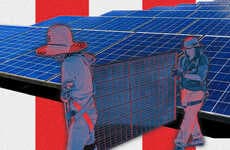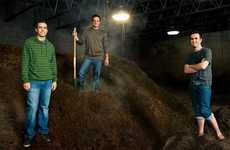
Community Solar Bonds in Canada
Bianca — February 1, 2012 — Social Good
References: trendhunter
We recently profiled SolarShare, a renewable energy cooperative that allows Canadians to easily become impact investors through solar bonds. In the questions below, Julie Leach, the Member Coordinator of SolarShare, shares her experience in the social enterprise space, including what inspired her to join and a bit more background on the business model.
4 Questions with Julie Leach, Member Coordinator of SolarShare
How did the idea for the business model come about?
SolarShare was developed by TREC Renewable Energy Co-op in 2010 to engage more communities in the development of solar. It has been demonstrated that when renewable energy is built, owned, and operated by citizens, we see significantly more benefits than when it is owned by large corporate developers. In areas where renewable energy development engages communities and gives them a financial stake in the projects, we see more projects deployed, awareness around making smart energy choices, local pride, and of course we keep profits and jobs local. Then the FIT and microFIT programs initiated in 2009 really kick-started the SolarShare business model and made it possible.
2. How did you decide to join this sector?
I've always been interested in the idea of communities being self-reliant. I think that as we see the phase-out of coal and other dirty forms of electricity generation, we will have to make a choice of how to deploy renewables democratically and with public involvement. The idea of providing every Ontarian with the opportunity to invest and benefit from local solar seemed brilliant to me and I wanted to help get the word out. The co-operative model also appeals to me because it is a democratic, collaborative, supportive environment to work in.
3. How do you get your inspiration?
I am inspired by communities around the world entirely powered by renewable energy and I am very optimistic that this is an achievable goal for us. Community power has endless potential, not just in Ontario but also in the developing world. SolarShare co-op members also inspire me every day with their enthusiasm and commitment to the community power movement.
4. How do you reset yourself to be creative? Do you have any rituals?
The staff works very hard to achieve our goals and work life can be stressful and fast paced. That is why some of our staff shares a ritual of doing a yoga class on Wednesdays lunch. This always helps me come back to the office refreshed and ready to think creatively.
4 Questions with Julie Leach, Member Coordinator of SolarShare
How did the idea for the business model come about?
SolarShare was developed by TREC Renewable Energy Co-op in 2010 to engage more communities in the development of solar. It has been demonstrated that when renewable energy is built, owned, and operated by citizens, we see significantly more benefits than when it is owned by large corporate developers. In areas where renewable energy development engages communities and gives them a financial stake in the projects, we see more projects deployed, awareness around making smart energy choices, local pride, and of course we keep profits and jobs local. Then the FIT and microFIT programs initiated in 2009 really kick-started the SolarShare business model and made it possible.
2. How did you decide to join this sector?
I've always been interested in the idea of communities being self-reliant. I think that as we see the phase-out of coal and other dirty forms of electricity generation, we will have to make a choice of how to deploy renewables democratically and with public involvement. The idea of providing every Ontarian with the opportunity to invest and benefit from local solar seemed brilliant to me and I wanted to help get the word out. The co-operative model also appeals to me because it is a democratic, collaborative, supportive environment to work in.
3. How do you get your inspiration?
I am inspired by communities around the world entirely powered by renewable energy and I am very optimistic that this is an achievable goal for us. Community power has endless potential, not just in Ontario but also in the developing world. SolarShare co-op members also inspire me every day with their enthusiasm and commitment to the community power movement.
4. How do you reset yourself to be creative? Do you have any rituals?
The staff works very hard to achieve our goals and work life can be stressful and fast paced. That is why some of our staff shares a ritual of doing a yoga class on Wednesdays lunch. This always helps me come back to the office refreshed and ready to think creatively.
Trend Themes
1. Community Solar Bonds - The use of community solar bonds as a renewable energy financing model presents opportunities for impact investors to fund renewable energy projects while empowering communities and promoting clean energy.
2. Renewable Energy Cooperatives - The development of renewable energy cooperatives offers the potential to democratize renewable energy production and increase local involvement and ownership while promoting renewable energy as a sustainable solution to reducing carbon emissions.
3. Community Power Movement - The growth of the community power movement presents opportunities to develop renewable energy projects using a collaborative, democratic, and community-driven model that empowers individuals to take control of their energy sources and reduce their carbon footprint.
Industry Implications
1. Renewable Energy - The renewable energy industry can benefit from the use of community solar bonds and renewable energy cooperatives to fund projects and increase community involvement while promoting sustainable and clean energy production.
2. Impact Investing - The impact investing industry can take advantage of community solar bonds to fund renewable energy projects while generating social and environmental impact by promoting clean energy, reducing carbon emissions, and empowering local communities.
3. Social Enterprise - The social enterprise industry can leverage the growth of the community power movement and the use of renewable energy cooperatives to promote sustainable development and empower individuals and communities to take control of their energy sources and reduce their carbon footprint.
2
Score
Popularity
Activity
Freshness























